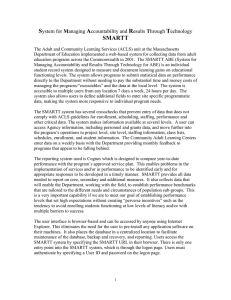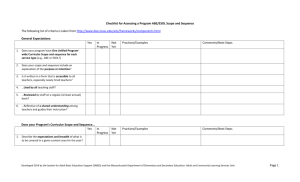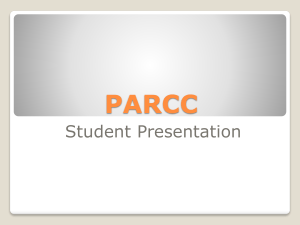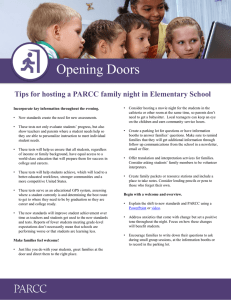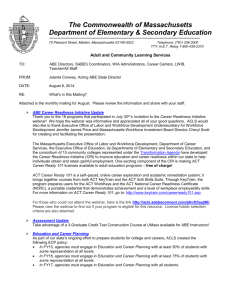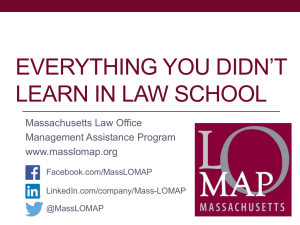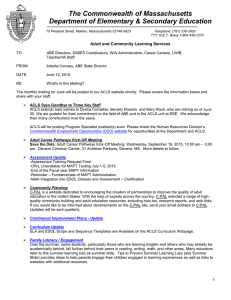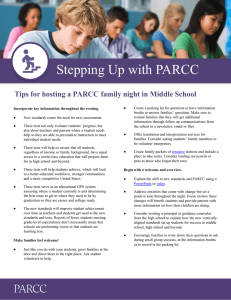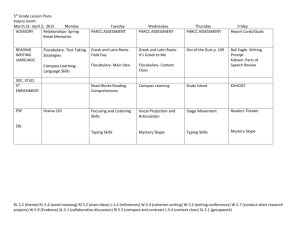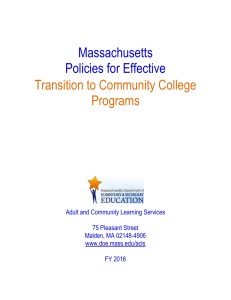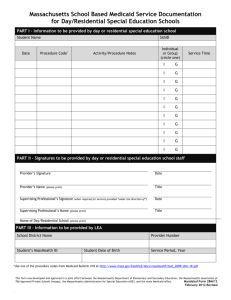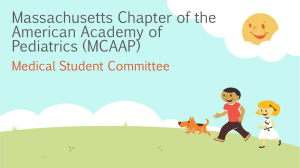September 2014 ACLS Monthly Mailing Back to School Resources
advertisement
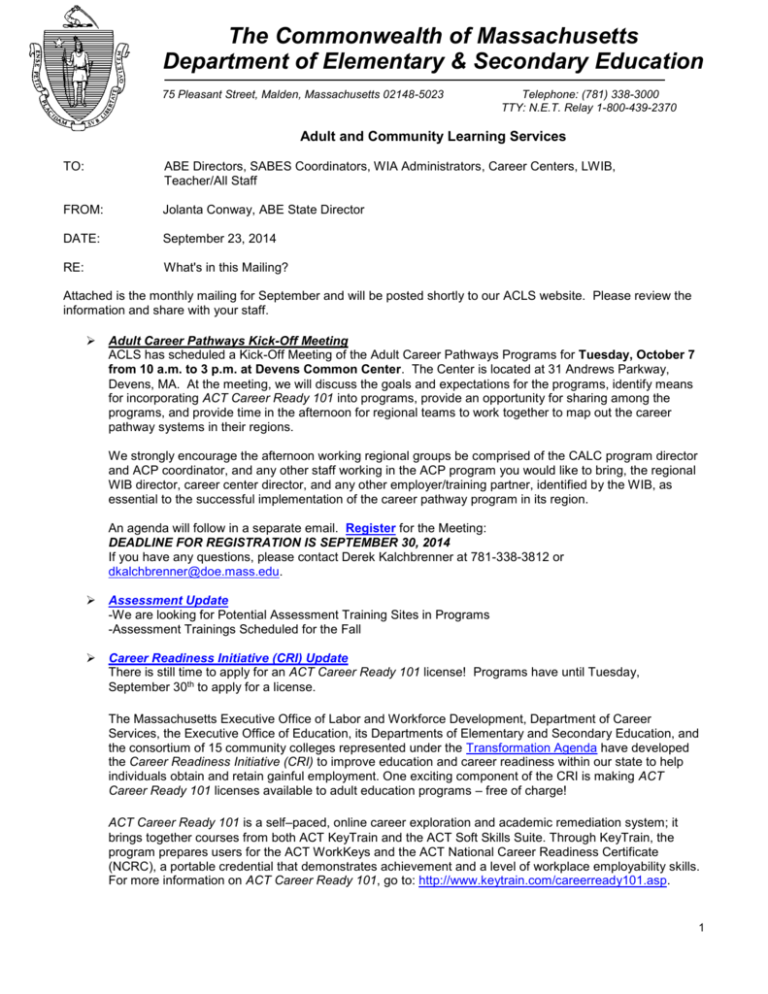
The Commonwealth of Massachusetts Department of Elementary & Secondary Education 75 Pleasant Street, Malden, Massachusetts 02148-5023 Telephone: (781) 338-3000 TTY: N.E.T. Relay 1-800-439-2370 Adult and Community Learning Services TO: ABE Directors, SABES Coordinators, WIA Administrators, Career Centers, LWIB, Teacher/All Staff FROM: Jolanta Conway, ABE State Director DATE: September 23, 2014 RE: What's in this Mailing? Attached is the monthly mailing for September and will be posted shortly to our ACLS website. Please review the information and share with your staff. Adult Career Pathways Kick-Off Meeting ACLS has scheduled a Kick-Off Meeting of the Adult Career Pathways Programs for Tuesday, October 7 from 10 a.m. to 3 p.m. at Devens Common Center. The Center is located at 31 Andrews Parkway, Devens, MA. At the meeting, we will discuss the goals and expectations for the programs, identify means for incorporating ACT Career Ready 101 into programs, provide an opportunity for sharing among the programs, and provide time in the afternoon for regional teams to work together to map out the career pathway systems in their regions. We strongly encourage the afternoon working regional groups be comprised of the CALC program director and ACP coordinator, and any other staff working in the ACP program you would like to bring, the regional WIB director, career center director, and any other employer/training partner, identified by the WIB, as essential to the successful implementation of the career pathway program in its region. An agenda will follow in a separate email. Register for the Meeting: DEADLINE FOR REGISTRATION IS SEPTEMBER 30, 2014 If you have any questions, please contact Derek Kalchbrenner at 781-338-3812 or dkalchbrenner@doe.mass.edu. Assessment Update -We are looking for Potential Assessment Training Sites in Programs -Assessment Trainings Scheduled for the Fall Career Readiness Initiative (CRI) Update There is still time to apply for an ACT Career Ready 101 license! Programs have until Tuesday, September 30th to apply for a license. The Massachusetts Executive Office of Labor and Workforce Development, Department of Career Services, the Executive Office of Education, its Departments of Elementary and Secondary Education, and the consortium of 15 community colleges represented under the Transformation Agenda have developed the Career Readiness Initiative (CRI) to improve education and career readiness within our state to help individuals obtain and retain gainful employment. One exciting component of the CRI is making ACT Career Ready 101 licenses available to adult education programs – free of charge! ACT Career Ready 101 is a self–paced, online career exploration and academic remediation system; it brings together courses from both ACT KeyTrain and the ACT Soft Skills Suite. Through KeyTrain, the program prepares users for the ACT WorkKeys and the ACT National Career Readiness Certificate (NCRC), a portable credential that demonstrates achievement and a level of workplace employability skills. For more information on ACT Career Ready 101, go to: http://www.keytrain.com/careerready101.asp. 1 On July 30th, ACLS staff, Executive Office of Labor and Workforce Development Undersecretary for Workforce Development Jennifer James Price, and Massachusetts Workforce Investment Board Director Cheryl Scott hosted an Invitation to the Career Readiness Initiative webinar for ABE Programs. For those who could not attend the webinar, here is the link http://acls.adobeconnect.com/p6v3t3auj96/. Programs have until Tuesday, September 30th to apply! Please review the attached license holder selection criteria and consider applying for this great resource! Curriculum Update -ABE Staff are invited to the DESE 2014 Seventh Annual Summit on Curriculum, Instruction, and Assessment on Monday, October 27th, and Tuesday, October 28, 2014. Date: October 27, 2014 and repeated on October 28, 2014 Time: 8:45am - 3:30pm (registration will open at 7:30am) Place: Best Western Royal Plaza Hotel and Conference Center (Marlborough, MA) Number of Staff who may Attend: Up to three representatives (e.g., director, curriculum leader, teachers) Please note that due to space limitations, walk-in participants will not be allowed. Family Engagement: In FY 14, almost half (43%) of the adult learners served in our core programs were parents of children ages 18 years or younger. Please see below “back to school” resources as well as information on a free training opportunity on financial education that relates to your learners who are parents: Back to School Resources for Parents According to a recent report, young people aren't the only ones who get back-to-school blues. Even dogs can get upset when their best buddies disappear with the beginning of school! These resources and tips won’t be of much use to your students who are dog owners, but they can help ease the stress of going back to school for the young people in their lives. Free Symposium on Promising Practices in Financial Education for Parents of Young Children Birth to Grade 3: October 24, 2014, 8-4 Devens (Only 30 seats available to date) The goal of this symposium is to provide the most current information on how networks, programs and agencies can be instrumental in increasing parents’ financial skills and behaviors and overall family financial well-being. Morning coffee, lunch, an afternoon ice cream social and a door prize (IPad mini) will be provided. See attached detailed information on this symposium sponsored by the Massachusetts Department of Early Education and Care (EEC) and the Massachusetts Association for Community Action (MASSCAP). Register here: Symposium-FinEd-Oct24 Open Educational Resources Repository The Transformation Agenda has announced an exciting resource, the Open Educational Resources (OER) Repository. The repository contains curricula from over 100 programs that have been designed to improve retention and accelerate completion, using strategies that include condensed formats, eight-week terms, stackable credentials, and articulation from non-credit to credit-bearing courses. The repository also includes developmental educational curricula intended to reduce or eliminate the time students spend in developmental education. Users can search the repository by industry, which include Advanced Manufacturing, Biotechnology and Life Sciences, Clean Energy, Financial Services/Entrepreneurship, Healthcare, and Information Technology. Go to http://oermacc.edc.org/ to learn more. SMARTT Update -SMARTT System Moved -Students’ Highest Level of Educational Attainment -NRS Cohort Follow-up Entry into Postsecondary Education or Training -Convert Partial Intakes to Full Intakes -Steps to Start the New Fiscal Year -Data Entry Closed and Student Auto Exit Schedules -HiSET™ Data Matching -Performance Standards Reports for FY14 available in Cognos -SMARTT Training Schedule 2 Assessment Update, September 2014 We are looking for Potential Assessment Training Sites in Programs ACLS and the director of Assessment Professional Development for ESE-funded ABE programs, Joan Ford, are in the process of scheduling assessment trainings for the year. We are looking for sites, particularly in Boston and in the Northeast, that might be interested in hosting a training for about 15-20 practitioners. Boston locations need to be accessible by the subway. If you are interested (and perhaps have staff who need to be trained in administering assessments), please contact Joan Ford at joan.ford@bristolcc.edu. Thank you. Assessment Trainings Scheduled for the Fall The following trainings are scheduled for September and October. Please see the SABES calendar for more information and to register for these trainings: http://calendar.sabes.org. Additional trainings are in the process of being scheduled; please consult the SABES calendar for more information. For questions regarding these trainings, please contact Joan Ford at Joan.Ford@Bristolcc.edu or Jane Schwerdtfeger at janes@doe.mass.edu. BEST Plus: Monday, September 29, 2014, 9:00 – 4:00 pm at the Asian American Civic Association, Boston (Priority registration for Boston programs) BEST Plus: Monday, October 6, 2014, 9:00 – 4:00 pm at the Asian American Civic Association, Boston (Priority registration for Boston programs) CLAS-E Writing: Two Thursdays for one training: October 9 from 1:00 – 4:00 pm (Administration) and October 16 from 1:00 – 4:30 pm (Scoring) at the YMCA International Learning Center, Boston (Priority registration for Boston programs) CLAS-E Writing: Two dates for one training: Monday, October 20 from 2:00 – 5:00 pm (Administration) and Wednesday, October 22 from 2:00 – 5:30 pm (Scoring) at Notre Dame Education Center, Lawrence CLAS-E Reading: Thursday, October 2, 2014 from 1:00 – 4:30 pm at YMCA International Learning Center, Boston (Priority registration for Boston programs) MAPT: Friday, October 10, 2014 from 9:30 am – 12:30 pm at the Department of Elementary and Secondary Education, Malden Questions? The Center for Educational Assessment is responding to assessment questions from the field. Contact April Zenisky at aclstesthelp@educ.umass.edu. 3 ABE Career Readiness Initiative License Selection Criteria The Massachusetts Executive Office of Labor and Workforce Development, its Department of Career Services, the Executive Office of Education, its Departments of Higher Education and Elementary and Secondary Education, and the consortium of 15 community colleges represented under the Transformation Agenda have jointly developed the Career Readiness Initiative (CRI) to improve the education and career readiness services provided within the state to help individuals obtain and retain gainful employment. One component of the CRI program is making ACT Career Ready 101 licenses available to adult education programs. Career Ready 101 is a self-paced, online career exploration and academic remediation system for an unlimited number of users. For more information about ACT Career Ready 101, go to: http://www.keytrain.com/careerready101.asp. Programs interested in obtaining a Career Ready 101 license must meet the criteria below. In addition, once selected, programs will be required to sign a User/License Holder Agreement and meet the criteria therein. 1. A commitment to blended learning. Programs must demonstrate a commitment to blended learning, in which classroom instruction methods are combined with computer-mediated activities. For example, 1 hour of a 6-hour a week program would be spent in a computer lab using Career Ready 101. 2. A designated staff person (e.g., a teacher or “learning coach” for each course). Successful blended learning classes must have teachers or “learning coaches” to mentor, monitor, coach, and, on occasion (or as needed), instruct students. 3. Commitment to integrating into Program Design. Programs must incorporate the Career Ready 101 level class into their weekly schedules. For example, an evening Pre-ASE class that meets Tuesday and Thursday evenings from 5:00-8:00 will use Career Ready 101 Thursdays from 7:00-8:00. 4. Access to technology. The class must have regular access to computer labs or the use of laptop carts or tablets during scheduled meeting times. 5. Relationship with community college and/or career center. Priority will be given to programs that have established referral relationships with community colleges, and/or routinely have their students register with their local One-Stop Career Center. 6. Ensure staffing to meet needs of service delivery model and that staff are properly trained. 7. Agree to attend all regional user group meetings. 8. Agree to track and report outcomes and results. 9. Appropriate system requirements. Programs must be able to meet all the system requirements, which can be found at http://www.keytrain.com/requirements.asp. If your program can meet all of the above criteria, and if you are interested in obtaining a Career Ready 101 license, email Derek Kalchbrenner at dkalchbrenner@doe.mass.edu by September 30, 2014. In your reply, please describe briefly how you would like to integrate Career Ready 101 into your program. 4 Curriculum Update, September 2014 ABE Staff are Invited to the DESE 2014 Seventh Annual Summit on Curriculum, Instruction, and Assessment on Monday, October 27, and Tuesday, October 28, 2014. Date: October 27, 2014 and repeated on October 28, 2014 Time: 8:45am - 3:30pm (registration will open at 7:30am) Place: Best Western Royal Plaza Hotel and Conference Center (Marlborough, MA) Number of Staff who may Attend: Up to three representatives (e.g., director, curriculum leader, teachers) Please note that due to space limitations, walk-in participants will not be allowed. While this conference is oriented toward Kindergarten through grade 12 teachers in the Commonwealth, there are a number of sessions that are applicable to ABE teachers’ needs and interests. ACLS is thrilled to be able to offer to ABE programs the ability for directors and/or teachers to attend the Summit this year. Among the 16 sessions, the following sessions are recommended for ABE audiences: Session 4: Teaching “Writing to Text” to Adolescents: Strategies from Writing Standards in Action. Audience: 6 - 12 What can student writing teach us about writing to text? This session will examine this question through discussion of materials and instructional strategies that stem from The Writing Standards in Action Project, http://www.doe.mass.edu/candi/wsa/. The Project presents examples of high-quality student writing with annotations that highlight how each sample demonstrates competence in the state learning standards at each grade level. In addition to providing direct experience working with project materials and classroom approaches to writing to text, the session will also address how they may be used to support state and local initiatives related to implementation of the state literacy standards, preparation for the PARCC assessment and educator evaluation implementation. hidden=false&req Session 5: Writing to Texts in Grades 3 – 8. Audience: 3 - 8 Daily writing about texts in the classroom is the most effective preparation for writing on demand in formal assessments. PARCC Educator Leader Fellows will discuss how they have incorporated reading, writing, and research into curriculum units in all subjects in their districts. Participants will leave with examples of the grade 3-8 PARCC research simulation tasks and related performance assessments from ESE's Model Curriculum Units and district-created units. hidden=false&req Session 6: Bringing Disciplinary Literacy to Life: Stories from the Field. Audience: 7 - 12 Disciplinary literacy is an approach to literacy instruction that focuses on mastering literacy demands in specific content areas. The approach encourages the acquisition of academic and workplace language, promotes reading comprehension, and builds language proficiency. Disciplinary literacy also enhances the development of evidence-based argumentation and rhetorical skills in adolescence. The session will begin with a description of why disciplinary literacy matters and how the common core standards motivate the work, presented by Jacy Ippolito, author of Adolescent Literacy in the Era of the Common Core. Then we will be hearing from districts who have put disciplinary literacy into practice. District leaders will leave the session with an understanding of the essential domains included in disciplinary literacy: vocabulary, discussion, digital literacy, use of multiple texts, and writing to learn. District leaders will also leave with exemplars from districts who are engaged in the work and a chapter from Mr. Ippolito’s book. hidden=false&req Session 7: The Implications of PARCC Math Assessments for Math Instruction in grades 3-8. Audience: 3 -8 The goal of this session is to increase participants’ understanding of the PARCC Math decision-making. The session will focus on Mathematical Practice #4 - Model with Mathematics; however the same strategy can be applied across all standards of mathematical practice. Participants will examine PARCC sample items and consider practical classroom strategies that will prepare students for them. The session will feature district math teachers, DESE math staff and PARCC fellows. hidden=false&req 5 Session 8: Connections: Model Curriculum Units, Aligned Curriculum, Educator Evaluation, and PARCC. Audience: K - 6 This session will focus on ESE’s Model Curriculum Units as opportunities to connect work on aligned curriculum with evidence for Educator Evaluation Standard I Curriculum, Planning, and Assessment while preparing students for the rigors of PARCC. The audience for this session is curriculum coordinators, directors or instructional teams who are interested in changing or adjusting their curriculum to increase alignment with the Massachusetts Curriculum Frameworks. This session will also be useful to districts considering implementing ESE’s Model Curriculum Units. Participants will review the standards-based components of ESE’s Model Curriculum Units and learn how these units are examples of the Frameworks in action and solid core instruction to support a range of learners. Information about the variety of ways districts have adapted, implemented or used ESE’s Model Curriculum Units to design their own units will be presented. Participants will discuss evidence from teaching a Model Curriculum Unit that would address Educator Evaluation Standard I. The session will include examples of the Curriculum Embedded Performance Assessments (CEPAs) which are included in every Model Curriculum Unit and explore how the CEPAs compare to the assessment tasks in PARCC. Participants will gain an understanding of the connection between these three initiatives, ideas for further work in curriculum alignment, and an overview of the Model Curriculum Units as well as ESE’s support of implementation or adaption of the units. hidden=false&req Session 9: Maximizing Impact & Efficiency: Educator Evaluation Implementation Strategies from the Field. Audience: PreK – 12 In this session, participants will learn about strategies MA districts are employing to create evaluation systems that promote educator growth and development through clear shared expectations, systems that support and respect both educator and evaluator capacity, and opportunities for reflection and feedback. Featured examples will include strategies evaluators use to create coherence between implementation of practices embodied in the Curriculum Frameworks and the educator evaluation framework. Participants will take part in strategic planning activities that will provide time for district teams to discuss how the ideas and practices shared can be put to use in their local contexts. Session 12: Leveraging EDWIN to Strengthen Curriculum, Instruction and Assessment. Audience: PreK 12 The Department of Elementary and Secondary Education, in partnership with Thinkgate, is excited to bring you Edwin Teaching and Learning (ET&L). It is rare in education that we can have curriculum materials, curriculum mapping, unit planning, lesson planning, resources, assessments, and our frameworks all in one place. With district access to the ET&L tool, your faculty can create assessments with MCAS released items, use Model Curriculum Units and Lesson Plans, and also access PBS Learning Media content – all aligned to the MA Curriculum Frameworks including CVTE. ET&L also has the Competency Tracking system for CVTE, specifically designed by and for Massachusetts educators. The extensive reporting features allow teachers to identify students who are struggling and the specific standards where they are challenged. Resources tagged to standards provide teachers tools to address the needs of various students. Access near-real time teacher, student, and course information which is fed into the tool with a seamless connection to your Student information System. Do you have District Determined Measures (DDMs)? Use Edwin’s assessment builder tool. Then, have your students access those assessments online where they are automatically graded, or opt for paper tests where you can input their results for analysis. This session will provide a live demonstration of the features of the Edwin Teaching and Learning, and an opportunity to hear from some of the state’s most knowledgeable early adopters who can describe how they have been using EDWIN to strengthen their curriculum and instruction. Session 16: Emerging Practices in Turnaround Schools: Key Levers with Impact. Audience: PreK - 12 What are the specific strategies or practices observed in Achievement Gain schools that explain how schools have been able to accelerate and sustain students’ academic growth? What can we learn from districts and from Achievement Gain schools—those schools that exited Level 4 status—in contrast to schools that were not able improve student achievement, with respect to: (a) how districts and schools used authorities afforded by state and federal law; (b) how districts and schools targeted resources; and (c) how districts organized to monitor and support turnaround efforts? Focusing exclusively on the experience of Massachusetts’ initial 34 Level 4 schools during the first three years of turnaround (2010-11 to 2012-13), we have isolated key findings that may be used by school and district administrators and other key stakeholders to continue to make informed decisions about how to improve the success of ongoing and future turnaround efforts. 6 To register, please click on the link for the day in which you wish to attend: Link for Monday, October 27, 2014: http://www.surveygizmo.com/s3/1794354/2014-Fall-Summit-Monday-October-27-2014 Link for Tuesday, October 28, 2014: http://www.surveygizmo.com/s3/1794178/2014-Fall-Summit-Tuesday-October-28-2014 Questions? Contact Jane Schwerdtfeger at janes@doe.mass.edu 7 September 2014 ACLS Monthly Mailing Back to School Resources for Parents According to a recent report, young people aren't the only ones who get back-to-school blues. Even dogs can get upset when their best buddies disappear with the beginning of school! These resources and tips won’t be of much use to your students who are dog owners, but they can help ease the stress of going back to school for the young people in their lives. PBS PARENTS: Back-to-School Tips for Parents o Before School Starts o Tips to Ease the Transition to Full-Day School o The First Days of School o Settling In o Parents’ Separation Pangs o Allergies at School o Starting School Tips for Parents (presented by children’s age) o What to Do When Your Child Doesn’t Like the Teacher HOMEROOM, the official blog of US Department of Education o Get in Gear for the New School Year: Back-to-School Tips for Parents o Countdown to School Success FUTURE READY: Back to School Preparations for Parents o What parents can do to prepare their children for the kindergarten classroom o Help freshman transition to college o Resources to help demystify the Common Core State Standards. CHILDREN’S TRUST: Preparing Your Child for Elementary School NATIONAL ASSOCIATION OF SCHOOL PSYCHOLOGISTS: Back-to-School Transitions: Tips for Parents o Before School Starts o The First Week o Overcoming Anxiety o Extracurricular Activities o When Problems Arise COLORIN COLORADO: Helping Children Read to Succeed (available in English and Spanish) o What you can do at home o Helping your child succeed at school o Building Strong Parent-Teacher Partnerships o Let's read: Fun reading tips, activities, and more! 8 Department of Early Education and Care and the Massachusetts Association for Community Action SYMPOSIUM ON PROMISING PRACTICES IN FINANCIAL EDUCATION FOR PARENTS OF YOUNG CHILDREN FRIDAY, 10/24/14, 8AM TO 4PM DEVENS COMMON CENTER, 31 ANDREWS PARKWAY, DEVENS, MA Register: Symposium-FinEd-Oct24 9 EVENT DETAILS 8:00 – 9:00 Registration Opening Plenary – Connecting Early Learning Communities To Asset Building Welcome! (Jennifer Amaya-Thompson, EEC and Joe Diamond, MASSCAP) Tom Weber, Commissioner, Massachusetts Department of Early Education and Care 9:00-10:30 Steven Grossman, Massachusetts State Treasurer (Invited) Mary Ann Higgins, Regional Administrator, ACF Tom Shapiro, Institute on Assets and Social Policy, Heller School, Brandeis University, Keynote 10:45-12:15 Promising Practices in Financial Education for Parents of Young Children –Workshops (partial list) Financial Education for Young Children Panel--Promising Practices in Financial Education for Parents of Young Children(CFCE providers/partners/parents) Financial Education Toolkit-Mini Course Understanding Credit 12:15 to 1:00 Lunch (Provided at no charge. See information regarding special diet requests.) 1:15- 2:45 Promising Practices in Financial Education for Parents of Young Children-Workshops Repeat of morning session, plus more! 3:00-4:00 Networking, Brainstorming, Door Prize Ice cream social – Networking “World Café” session on implementing and sustaining financial education in your program, practice or community Door prize (IPad mini!) ORGANIZERS The Massachusetts Department of Early Education and Care (EEC) and the Massachusetts Association for Community Action (MASSCAP) For further information about the symposium contact: Patricia Pelletier, email- patricia@pelletier-consulting.com MASSCAP, 508-982-8535, or Jennifer Amaya-Thompson, HSSCO/EEC, 617-988-6634, jennifer.amayathompson@state.ma.us For additional information about this project, click the following link: http://www.mass.gov/edu/birth-grade-12/earlyeducation-and-care/workforce-and-professional-development/training-and-orientation-resources/financial-literacyeducation-project-.html If you require disability related or dietary accommodations in order to fully participate in this event please contact Patricia Pelletier at patricia@pelletier-consulting.com or 508-982-8535 by no later than September 26th so we can accommodate your request. _________________________________________________________________________________________________________________________________________ 10 SMARTT Update, September 2014 1. SMARTT System Moved The SMARTT system was officially moved to FY15 on Thursday, September 4th at 6:30 PM. Sites with approved program plans were moved to FY15. Additional sites will be immediately moved to FY15 once the plan for FY15 is approved. If the approved plan is revised and submitted at a later date, please note the changes for your Program Specialist since the changes/updates need to be made manually. 2. Students’ Highest Level of Educational Attainment Because of changes in the way that the National Reporting System (NRS) captures state data, ACLS now needs programs to more accurately report students’ highest levels of educational attainment. Going forward two questions on the intake form will require additional probing: 1) Last Grade Completed, and 2) Schooling Completed. If a student says that the last grade he/she completed was 10th, then the staff person must not assume that that student does not have a high school credential. The staff person must still ask about that student’s schooling (e.g., what kind of credential he/she received if any). In some countries, only 10 years of schooling are needed to obtain a high school equivalency credential. The opposite of this is also true; if a student says that he/she had 12 years of schooling, the staff person should not assume that that student has the equivalent of a high school credential. This portion of the intake might require a follow-up question about how many years of schooling is needed in that student’s country in order to get a high school credential or its equivalent. Moreover, some students believe that the information they give during intake will affect whether they receive services; therefore, it is crucial that program staff make students feel comfortable answering questions during intake. 3. NRS Cohort Follow-up - Entry into Postsecondary Education or Training: We want to emphasize the importance of follow-up for the NRS Cohort “Entry into Postsecondary Education or Training” measure. When contacting students you should ask if they entered into higher education or if they entered into any occupational training program. Occupational training programs teach job skills and provide job placement services for adults who are at least 18 years of age. The programs are administered locally by One Stop Career Centers. 4. Convert Partial Intakes to Full Intakes Programs must convert all partial intakes to full intakes that were created in July and August so that newly enrolled summer students could take the MAPT test. If the student left prior to MAPT testing, please delete the partial intake. The partial intakes can be deleted only if no MAPT tests were administered. The MAPT scores will not appear in the student assessment screen or in the assessment reports until the partial intake has been converted to a full intake. 5. Steps to Start the New Fiscal Year Please review the steps on the SMARTT section of the ACLS website to make sure that all the information is updated and accurate: http://www.doe.mass.edu/acls/smartt/startsteps.html. a) Use the “Class Completion” screen to set-up your classes so that you can enroll students and enter attendance. Once the classes are completed, they will appear in the ABE Directory under “Class Schedule”. b) When assigning teachers to classes, the teacher must be listed in the “Staff” section. The instructor names will appear in the class lookup screen if adequate teaching hours are entered in the staff salary record. c) If you are intaking a student who is listed on the waitlist screen, find the student record in the waitlist search, click on the student name, and then click on “Convert to Full” on the left menu. d) When entering assessments, don't forget to mark an area as “Primary”. Students can be enrolled in classes, but attendance cannot be entered until the primary area is set. If appropriate, select and copy over any May/June assessments administered in the previous fiscal year for returning students if a new test has not been administered. You will see a box in the first column under the copy icon next to the May/June test. Click on the box and hit "Save" and the test will be copied to the next fiscal year. The copied scores will be 11 pre-tests for the new fiscal year and will be color coded to indicate they were copied. They will be listed with a 7/1 date. e) Update project and site coordinator names and work e-mails to ensure that ACLS notifications are sent to the correct staff member. If this is not updated, crucial news and notifications will not reach them. 6. Data Entry Closed and Student Auto Exit Schedules Please note the schedule below when student intakes and attendance data must be entered. FY15 Monthly Attendance July, August, & September October November December January February March April May June Month/Day Data Entry Closed November 30 December 31 January 31 February 28 March 31 April 30 May 31 June 30 July 31 August 31 The NRS requires states to automatically report follow-up measures for all students who meet certain criteria for each outcome measure. This automatic cohort designation varies according to each follow-up measure. Once the program documents in SMARTT that a student is no longer participating, that student officially becomes part of a cohort based on certain characteristics (e.g., have a job/do not have a job; have a high school equivalency credential/do not have a high school equivalency credential). Because our state tracks student outcomes, programs must exit students from SMARTT when they move on from the program. To ensure that students are exited when they have no attendance entered for 90 days or more, we implemented an automatic exit policy. When BOTH of the following occur, SMARTT will automatically exit a student from the site: 1) No attendance was recorded for that student during the three most recent months which have been “locked out” from data entry, and 2) No attendance has yet been entered for that student during the current two month period for which data entry is allowed. Automatic Exit Schedule Automatic Exit Schedule December 1 January 15 February 15 March 15 April 15 May 15 June 15 July 15 August 15 Month of Last Attendance June July August September October November December January February No Attendance in These Months July – November August – December September – January October – February November – March December – April January – May February – June March – June System Assigned Exit Date June 30 July 31 August 31 September 30 October 31 November 30 December 31 June 30 June 30 September 15 March April – June June 30 7. HiSET™ Data Matching If you find that a student passed the HiSET™ and the record was not updated in SMARTT, email Tom Mechem (tmechem@doe.mass.edu) to determine what data element was incorrect so that the record can be corrected. 12 8. Performance Standards Reports for FY14 available in Cognos The performance standards reports for Community Adult Learning Centers and Correctional Institutions are now available in Cognos. The high school equivalency credential goal data will continue to be updated through September 30. 9. SMARTT Training Schedule The following upcoming trainings are on the SABES website at: http://calendar.sabes.org. Register by clicking on the register icon on workshop title on the SABES calendar. September 8 - September 26 DL: Cognos Update: Accessing Performance Standards Reports (online) September 15 - September 26 DL: SMARTT New User Training (online) September 20 SMARTT Update: Starting the New Year – online (10:00 am - 12:00 pm) If you need SMARTT / Cognos help, email smartthelp@gmail.com, and include a clear subject header. You do not need to include detailed information in the initial email to smartthelp. A short subject is adequate because once you send an email, you will receive an auto-response containing a link to a form; fill out this form completely, and hit the “Submit” button at the end. You will be contacted either by phone or email shortly afterwards by the SABES field technologist if further information is needed. 13
